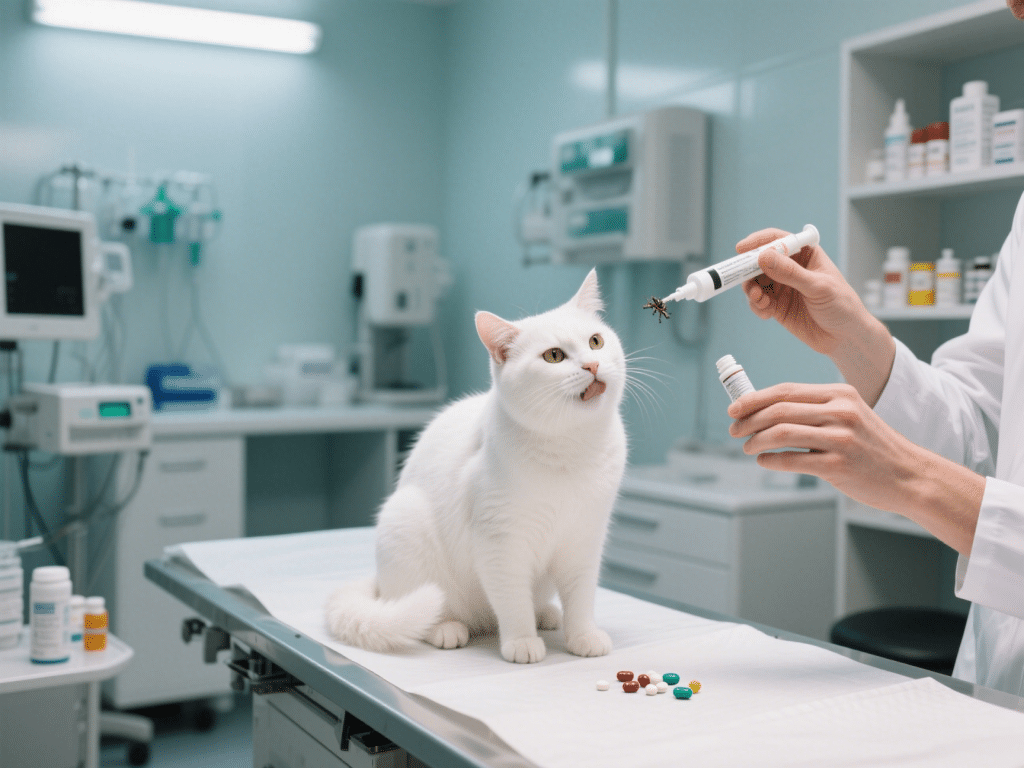How to Deworm Cats for Fleas: A Step-by-Step External Parasite Guide
How to Deworm Cats for Fleas: A Step-by-Step External Parasite Guide
Fleas are more than just a nuisance—they are external parasites that can lead to serious health issues for cats, including allergic reactions, anemia, and the transmission of tapeworms. Deworming cats for flea-related concerns involves a comprehensive approach to break the cycle of infestation and prevent reinfestation. This guide outlines a practical, step-by-step process for tackling flea infestations, with trusted product recommendations and best practices.
Step 1: Identify Flea Infestation
The first step in managing fleas is to recognize the signs. Cats may exhibit excessive scratching, biting, or grooming, especially around the neck and tail. You may also observe small black specks (flea dirt) or even fleas moving through the fur. Fleas are fast-moving and often difficult to spot, so a fine-toothed flea comb can help detect them.
Step 2: Administer Flea Control Treatment
Choose a vet-approved topical or oral flea treatment based on your cat's age and weight. Always read the label and follow dosing instructions precisely.
· Recommended Products:
· • Revolution Plus: Treats fleas, ticks, ear mites, and prevents heartworm. Prescription required.
· • Advantage II for Cats: Kills fleas through contact; monthly topical application.
· • Capstar Oral Flea Tablets: Fast-acting treatment that begins killing fleas within 30 minutes.
Step 3: Deworm for Tapeworms
Since fleas are a common carrier of tapeworms, it’s crucial to follow up with a deworming treatment. Tapeworms often go unnoticed until segments are found in the cat’s feces or around the anus.
· Effective Dewormers:
· • Bayer Tapeworm Dewormer: Specifically targets tapeworms; easy-to-administer tablet.
· • Profender Topical Dewormer: Kills both tapeworms and roundworms; applied on the skin.
Step 4: Treat the Home Environment
Flea eggs and larvae can remain in carpets, bedding, and upholstery. Vacuum all areas thoroughly and wash pet bedding in hot water. Consider using flea sprays or foggers labeled safe for homes with pets to treat hidden eggs.
Step 5: Prevent Future Infestations
Prevention is the key to keeping fleas at bay. Administer monthly flea prevention treatments year-round, especially in warmer climates. Regularly groom your cat and maintain a clean living environment.
· Tips for Prevention:
· • Use year-round flea prevention products.
· • Keep indoor and outdoor environments clean.
· • Limit your cat’s exposure to untreated animals.
Conclusion
Fleas are persistent pests that require an integrated approach to manage effectively. By identifying infestations early, administering the right treatments, and maintaining a clean environment, you can ensure your cat remains healthy and parasite-free. Always consult with your veterinarian to tailor the best treatment and prevention plan for your feline companion.
*Disclaimer: This article is for informational purposes only and is not a substitute for professional veterinary care.*
Explore Dogs

Veterinarian Tips: Deworming Pregnant Dogs Safely
IntroductionDeworming pregnant dogs is essential to protect the dam and her puppies from congenital ...
Read More
Comparing Spot-On vs Pill Dewormers for Cats: Pros and Cons
IntroductionCat owners often face the choice between spot-on (topical) and pill (oral) dewormers. Ea...
Read More
Best-Tasting Dewormers for Cats: A Flavor Guide for Fussy Felines
Why Flavor Matters in Feline DewormingCats detect bitterness 100x more intensely than humans due to ...
Read More
How to Safely Combine Internal and External Dewormers for Cats
How to Safe Protocols for Combining Internal and External Dewormers in CatsEffective feline parasite...
Read More
How Often Should You Deworm Your Cat? Adjusting by Season
How Often Should You Deworm Your Cat? Adjusting by SeasonProtecting your cat from internal parasites...
Read More
Natural Deworming for Cats: Are Herbal or Essential Oil Solutions Safe?
Natural Deworming for Cats: Are Herbal or Essential Oil Solutions Safe?Many cat owners, seeking gent...
Read More
Why Is My Cat Drooling After Deworming? Causes and Care Tips
Why Is My Cat Drooling After Deworming? Causes and Care TipsNoticing your cat drooling after adminis...
Read More
Top 5 Cat Dewormers Compared: Vet-Approved Options for Internal and External Protection
Top 5 Cat Dewormers Compared: Vet-Approved Options for Internal and External ProtectionIntroductionI...
Read More
How Much Does Cat Deworming Cost? A Practical Guide with Recommended Products
How Much Does Cat Deworming Cost? A Practical Guide with Recommended Products?Cat deworming is a cru...
Read More